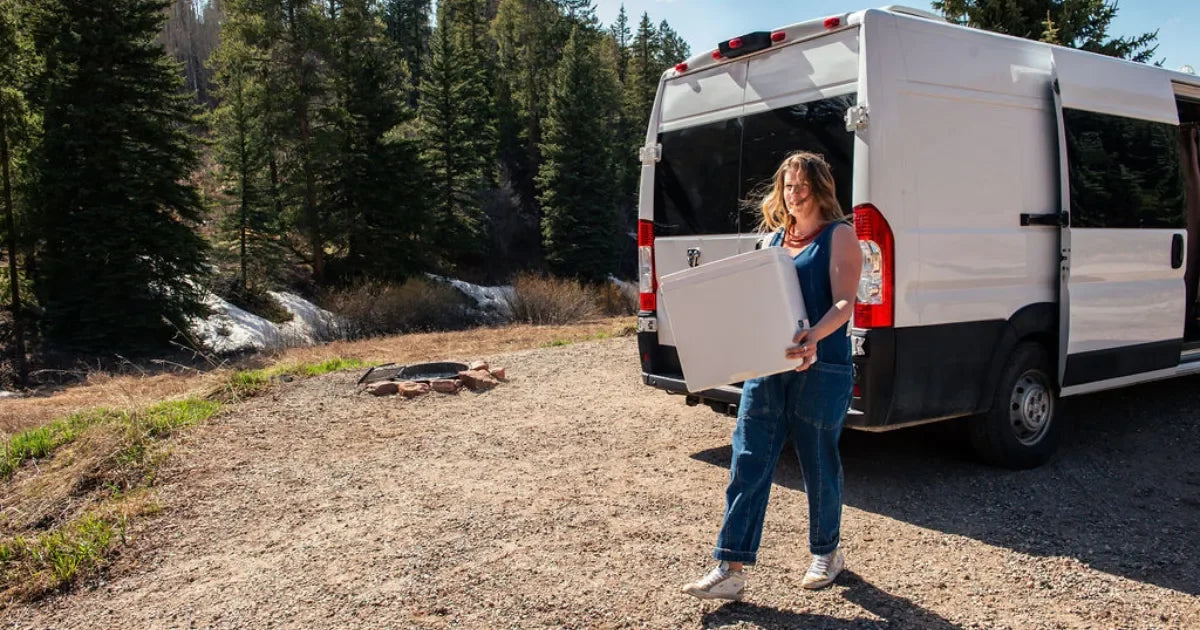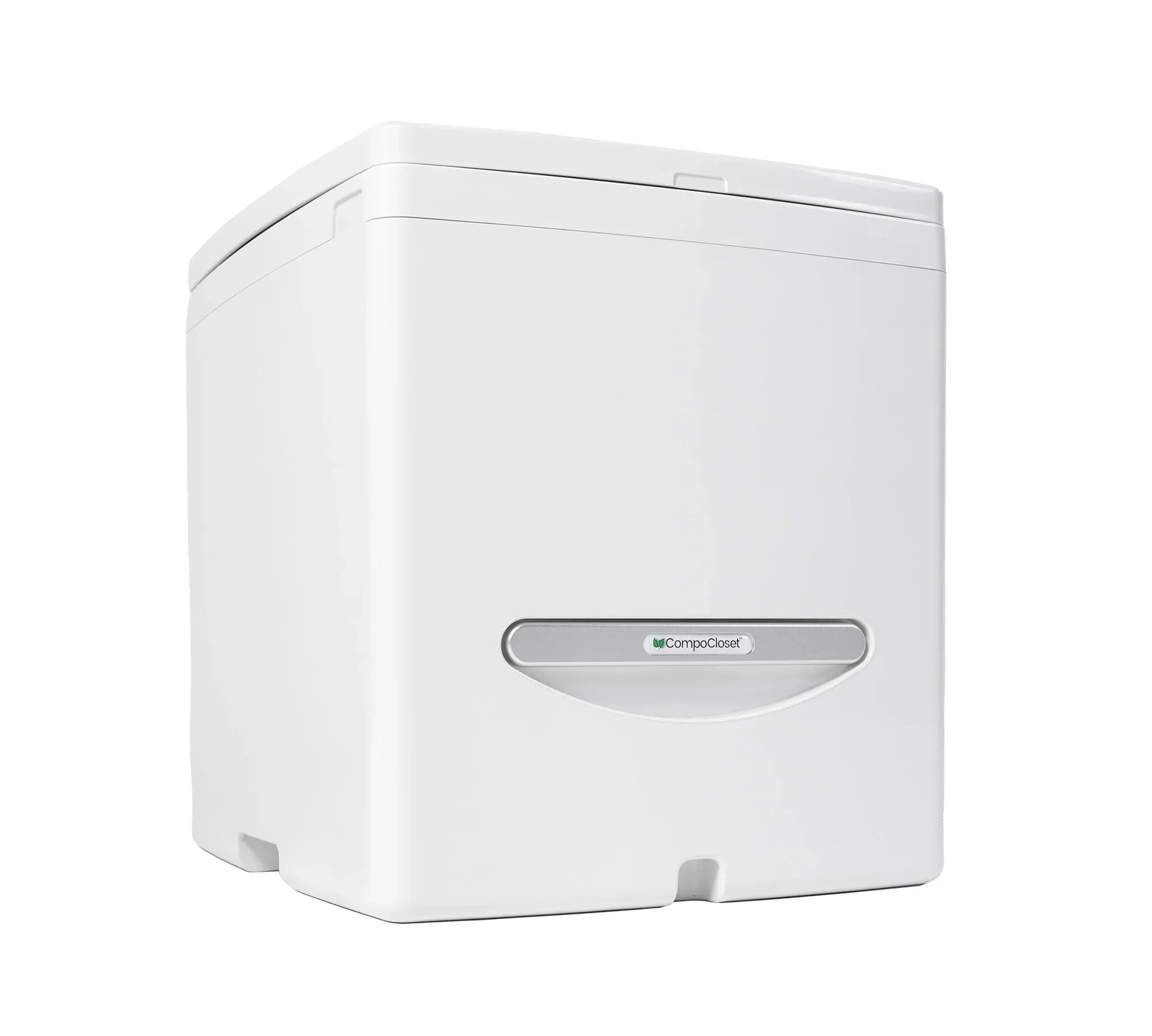Wanna know if you can put toilet paper (TP) in a composting toilet? Well, you've come to the right place because, in this post, we'll help you answer that very question.
We'll also take you a step further and explore which type of paper you'll need and whether it affects the compost you end up with.
Before we start chatting about toilet paper...
It's important to understand what sort of composting toilet you have or are looking for.
There are two categories of compost toilets:
- Self-contained - either purpose-built or purchased units made for static living, such as homes, tiny spaces, or cabins.
- Simpler/Portable - usually smaller purchased units made for tiny homes, trailers, RVs, motorhomes and camper vans, overlanding or marine heads.
Both typically start the composting process of Humanure and are turned out onto a compost pile to finish.
Our recommendation is to look for a urine-diverting dry toilet (UDDT), as by separating your wee from your poo, you stop the formation of sewage. It means that your poo also has more opportunity to start the composting process without any issues.
So why does that make a difference when it comes to toilet paper?
There are two reasons. Firstly, capacity. If you have a smaller unit, it will fill up quicker if you use loo roll. And secondly, depending on what your emptying options are, the type of loo roll you use could affect your compost nutrients.
Let's look at that in more detail by answering ten of the most common questions we get about using toilet paper in a compost toilet.

10 common questions about toilet paper and composting toilets
As manufacturers of the composting toilet, Cuddy, we often get asked about things like biodegradable toilet paper, so it made sense to answer them in one place and give you a more complete guide.
1. Do composting toilets require particular toilet tissue?
Technically speaking, no, you don't need specific toilet tissue. But. If you are looking for a more sustainably made paper that breaks down quicker and has fewer chemicals, then you need to do some digging.
Traditional TP uses tree pulp from virgin softwood and hardwood trees, plus water, at a ratio of 95.5% and 0.5% wood. In this process, they also introduce chemicals for extracting fibres, including bleach to whiten plys (usually choline dioxide) and chemicals for strength and absorbency. It is compostable and typically takes between one to three years for traditional TP to decompose.
Recycled toilet paper is more sustainably manufactured using paper waste instead of virgin materials, usually from things like newspapers. These rolls are often off-white in colour because they also use less bleach to whiten the plys.
According to Treehugger, bamboo options are better still because they use 30% less water in manufacture and have less need for chemical fertilisers during growth or harvest.
As a naturally strong fibre, bamboo needs no additional chemical help to make the paper more tensile, anti-microbial, or absorbent. Bamboo TP also breaks down quickly, especially in contact with water. In flushing tanks, this is almost instant, which is why they are considered "sceptic-safe". While there is less moisture in composting toilets and compost piles, the decomposition is still much quicker than traditional options.
2. What toilet paper is best for composting toilets?
So we've already talked a bit about this in question one, and hopefully, you're now considering something more sustainable and compostable.
One thing to look out for is an FSC or SFI logo on the packaging - a certification identifying forest management standards. This will ensure that the wood or bamboo sources your toilet paper brands come from avoid the rapid invasion of cultivation that encroaches on natural habitats in native and non-native countries, which is currently a big problem for some bamboo sources.
It's also a good idea to consider "ply" - how many layers your paper has. TPs that are too thick or quilted may not break down as quickly as those with just one or two plys. Not a problem if you are dumping solid bins at campsites in a compostable waste bag, but it is something to consider if you aim to compost your solid bin for use in the garden.
Once you've considered the toilet paper, you'll also want to consider storage and sourcing. That will be particularly important for our vanlife and tiny home community (hello!). If space is minimal or shop options are limited, you'll need to decide based on what you can get hold of and your legal disposal options. Here's a recent disposal guide that will offer you more help.
So, really, the best toilet paper for you will depend on your situation.
3. Can you throw toilet paper in a composting toilet?
Yes, in most cases.
The only time this becomes a consideration is when you have an agitator built into your portable compost toilet. Our Cuddy has one, and its purpose is to help you kickstart the composting process on the road - great for longer trips or vanlife solutions, this nifty gadget turns and aerates your composting poo. In this instance, you'll want to use your TP sparingly to avoid getting it stuck around the agitator shank.
However, you might prefer a portable, agitator-less Cuddy Lite on shorter trips, and in this case, you could use TP however you wanted to - LOL!
In all seriousness, using TP in your compost loo isn't a problem; it's more a consideration of whether you drop it into the loo or dispose of it separately. So consider how you want to use your toilet and what the rules are for emptying it.
4. Is dirty toilet paper compostable?
Yes, dirty toilet paper is compostable as long as it is not contaminated with harmful chemicals or substances and is suitable for your composting system.
5. Where do you put paper in a composting toilet?
You put your paper in the same place where you deposit your poo, the composting chamber (or solid bin if you have a portable version). The paper will decompose with the rest of the organic matter over time.
If you'd rather leave the toilet paper out to ensure your composting waste is entirely contaminate-free, use a spare biodegradable bag in another bin and empty it regularly.
6. How long does it take toilet paper to compost?
We skirted around this in question one, and it depends on the type of toilet paper you have, the composting conditions, and the method used.
Typically, traditional and recycled TP takes one to three years to compost, and bamboo toilet tissue can be much quicker.
You can do several things to help your composting materials decompose quickly.
- Agitate or turn your waste regularly
- Make sure your moisture balance is right
- Check that your ambient temperature is not too cold and causing the composting process to slow
- Avoid using too much TP with each visit
- Break up the toilet paper into smaller pieces after each visit (ok, that's difficult if it's dirty - we hear you! But agitation should help that breakdown)
8. Can you use paper towels as toilet paper in compost loos?
It is possible in portable options, but it isn't our advice.
We get it: you're stuck at a remote truck stop, and the last customer bought the very last pack of rolls... you reach for a stack of paper towels from the bathroom. They'll have to do.
Paper towels were not designed to decompose as TP does, so over time, they'll cause capacity issues and clumping at the very least. That's before they get stuck around your agitator. Eww!
However, if you have something like the Cuddy Lite that doesn't have an agitator and uses a compostable bag instead, you can get away with using the odd paper towel. And that's because, for the most part, you'll be disposing of your solids at designated dumping points like you would nappies.
9. Can I use wet wipes in my compost toilet
No.
Wet and baby wipes are loaded with chemicals that will kill your composting microbes. They may also have synthetic fibres, which you don't want making their way into the cells of your growing plants and veg.
We'd rather you avoid these products as they are a massive problem in polluting our oceans and landfills, harming wildlife and contributing to greenhouse gases.
10. Can you put the toilet paper's cardboard tube in a composting toilet?
Placing the cardboard tube from a toilet roll into a composting toilet is a great idea - compost loves carbon, so go ahead and toss the cardboard tube in!
If you are using a portable option, then always consider capacity. Cardboard toilet tubes are widely recyclable and could be disposed of at recycling points, giving you more room in your loo when you need to go.
The other thing you can do with these tubes, if you have a garden, is to use them for seedlings. This cuts down on purchasing manufactured containers, and they decompose, giving your soil more carbon.

Conclusion: Is adding toilet paper to your composting toilet a good idea or not?
It's perfectly acceptable to add toilet paper to your static composting toilet; it will degrade over time, even if you have to empty it more often as a result. Your choice of toilet paper will depend on what you ideally want from your compost, if full compost is what you are aiming for.
If you have a portable option, which mostly have agitators, then TP in your solids bin is a no-no: it creates unnecessary volume and gets caught up in the agitator mechanism.
Ok, so if you have a static option, are you looking for a "bio-degradable" toilet paper? No, not as a label. You are looking for an option that decomposes at the rate that suits your composting needs and offers a more sustainable manufacture.
Take some time to research and look beyond the sales pitch to find out what options are the best for you and your environment.
Have more composting toilet questions? Check out our other resources and join our mailing list below!






